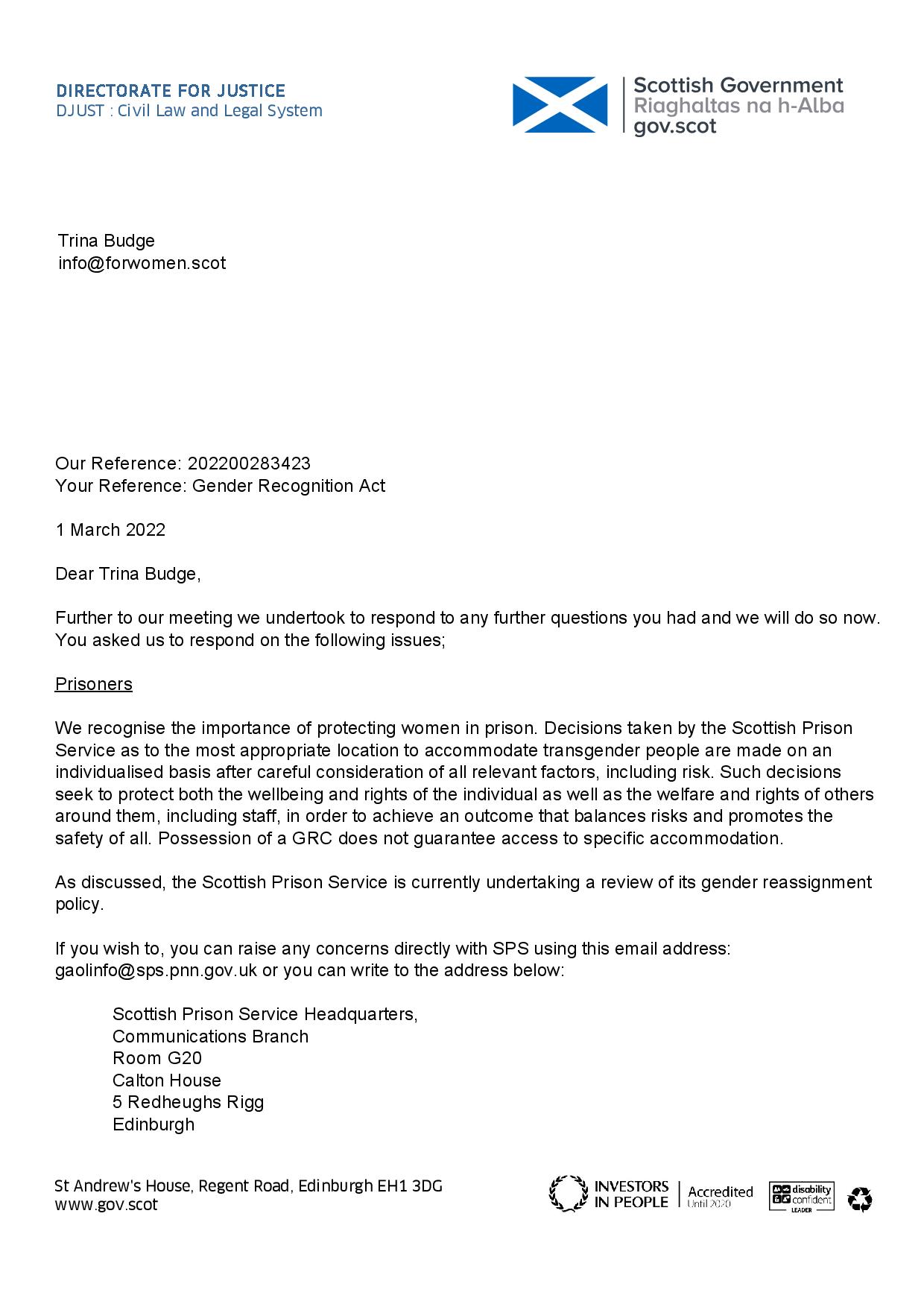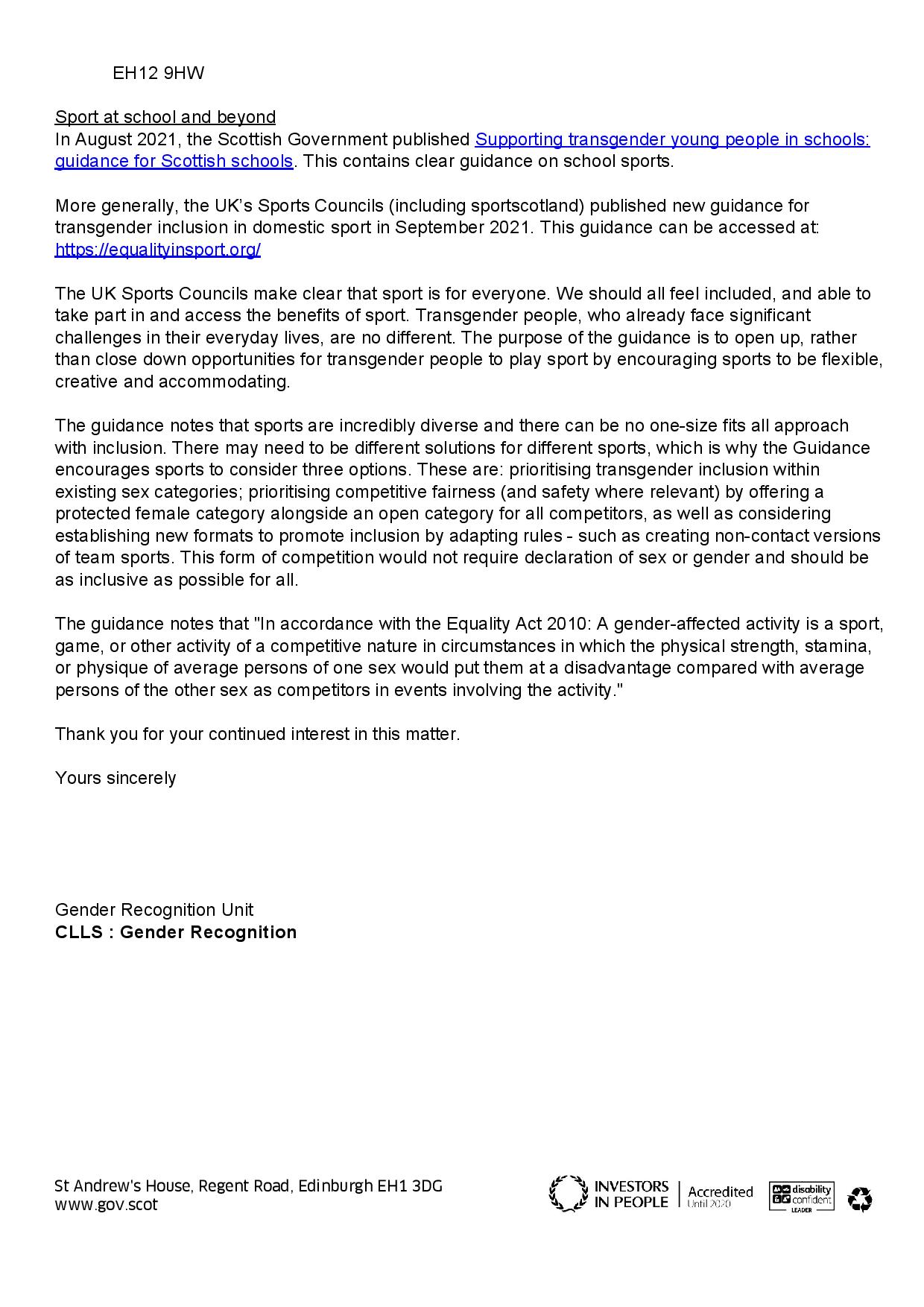Letter to Shona Robison
We sent the following email to Shona Robison, Cabinet Secretary for Social Justice, Housing and Local Government on 14 February 2022.
Dear Ms Robison,
We should like to thank you and your officials for meeting with us on 18th January to discuss proposed reform of the Gender Recognition Act.
We have been pleased to see the recent intervention by the EHRC, and we hope that Scottish Ministers will pay close heed and commit to ensuring that the proposed legislation does not interfere with or undermine the Equality Act. We have been extremely troubled by the intemperate, hostile and hyperbolic reaction from proponents of reforms which, troublingly, has included Ministers, members of the Equalities, Human Rights and Civil Justice Committee and government funded groups. As you were keen to stress, the operation of the Equality Act is a matter for Westminster and the EHRC, so we trust you will note their concerns.
We agree with their assessment that the reform as proposed is not simply a process of simplification, which arguably has already been achieved by plans to lower fees and digitalise applications, but a complete recategorisation of eligible applicants. To date, no reasonable explanation has been forthcoming for expanding the group eligible for a GRC beyond the small cohort who suffer from gender dysphoria to include anyone without checks or gatekeeping.
This lack of safeguarding is the more concerning as, as we raised in our conversation, the GRC does give holders additional rights by virtue of their “legal sex” status. For example, prisoners with a GRC are risk assessed as female, not male, and thus have an almost automatic right of entry into the female estate. In Ireland, this has resulted in infamous cases like that of Barbie Kardashian (whom the GID service in the UK deemed was not suffering from dysphoria). In Californian and Canada jails the situation for female prisoners is even more desperate. Contrary to what was argued in the meeting, this is not a matter for the SPS as the acquisition of a GRC makes it almost impossible for them to exercise discretion.
Furthermore, the GRC enables holders to bury evidence from their past to a degree which is not permissible for any other section of society. At a time when some are asking whether criminals, especially sex offenders, should be allowed to change their names, it is incredible that the Scottish Government is proposing a route which makes hiding past transgressions so simple. As a bare minimum, we hope the Government will entertain the notion that sex offenders should not have access to GRCs and that they can be revoked if holders commit acts of violence against women.
We maintain that it is incumbent on the Scottish Government to lead. There is a level of obfuscation (some deliberate) over the operation of single sex spaces which there is a reluctance to dispel. You rightly pointed out the services can exclude members of the opposite sex who identify as trans, including those with a GRC, however, the reaction of many – including MSPs and ministers – to the EHRC’s recent comments suggest some do not believe or accept this. We have seen recent evidence of officials from the Scottish Greens suggesting they may try to force their way into women only spaces on the basis that they erroneously believe them to be illegal.
How, then, are overworked or underpaid staff on the frontline of services, in hospitals, schools, gyms, or hostels to make judgement calls on the law when the Scottish Government is so reluctant to bring clarity to bear on this issue?
We also remain concerned about questions of age. It is, frankly, incomprehensible that while the Scottish Courts have determined that scientific evidence on cognitive maturity suggests that those under 25 should not be subject to the same sentencing as those over 25, the government is still considering whether children can make the irrevocable decision to change their legal sex. A decision too often linked to experimental treatments and with no clear route of reversal. If the Scottish Government has evidence that counters all the research in this field which indicates that most cases of gender dysphoria in adolescents resolves with watchful waiting, or if they have evidence that shows that cognitive maturity is a factor in crime but not gender identity, then it should be released.
Sadly, we have grave concerns about the process and the scrutiny of the issues to date. We echo Fair Play for Women’s concerns about cross-border implications and we are likewise astonished that the Civil Service are seemingly unaware that Irish GRCs are not valid in the UK. It is true that the Bill has been subject to two consultations. Troublingly, the myriad and evidenced issues which were thrown up by the consultations remain unaddressed suggesting that the process was for form only.
We hope that some of these points will be addressed before the proposed Bill lands at Committee. As reported this weekend, FoIs have revealed the process of engagement in the period since the election has been, in the words of Murray Blackburn MacKenzie “unfair and unreasonable” and “demonstrably biased, in which the government has insulated itself from having to engage with critics or the substance of their concerns”. They go on to say “It [parliament] will be asked to do so in the crucible of a highly charged atmosphere, where government and its allies have sat in private earnestly discussing the need for respectful debate while agreeing that all disagreement with them is misinformation.” We share their assessment that much work remains to be done to ensure this bias is corrected. We also fear that in an environment where ministers, MSPs and government funded charities have demonised and abused anyone – including the EHRC – expressing mild opposition or calls for better analysis it will be nigh impossible for arguments to be aired openly in Parliament. That should shame and sober this administration.
Kind regards,
Trina Budge, Marion Calder and Susan Smith
Directors, For Women Scotland
Update 01 April 2022: We have received no reply to this letter. With reference to our January meeting we received the following from Shona Robison on 01 March:


